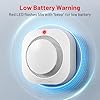Smoke detectors are devices that use radiation to detect the presence of smoke. The most common type of smoke detector is the ionization smoke detector, which uses a small amount of americium-241 to ionize the air and create an electric current. This current is used to trigger an alarm when smoke is present. While the amount of americium-241 in a smoke detector is very small, some people are concerned about the potential health effects of exposure to this radioactive element.
Contents
The Truth About Smoke Detector Radioactivity
Smoke detectors are an important part of any home or business fire safety plan, but some people worry about the radioactivity of the devices. Here’s a look at the truth about smoke detector radioactivity.
Smoke detectors contain a small amount of americium-241, a radioactive element. However, the amount of americium-241 in a smoke detector is very small and poses no health risk. In fact, the radioactivity from a smoke detector is less than the natural radioactivity that occurs in the environment.
Smoke detectors are required to meet strict safety standards, including limits on the amount of radioactivity they can emit. The Environmental Protection Agency (EPA) oversees these standards to ensure the safety of smoke detectors.
So, there’s no need to worry about the radioactivity of smoke detectors. They are safe devices that can help save lives in the event of a fire.
How does Smoke Detector Radioactivity Work?
Smoke detectors are a vital part of any home or office safety plan, but how do they work? Smoke detectors contain a small amount of radioactive material, usually americium-241, which emits alpha particles. These particles are attracted to particles of smoke, and when they come into contact, the smoke detector sounds an alarm.
The amount of radioactivity in a smoke detector is very small and poses no health hazard. In fact, the radioactivity is so low that it would take thousands of years for the americium to decay to a level that would be considered dangerous.
The Dangers of Smoke Detector Radioactivity
When it comes to home safety, smoke detectors are an essential piece of equipment. However, some smoke detectors contain small amounts of radioactive material, which can be dangerous if inhaled or ingested.
The radioactive material in smoke detectors is usually americium-241, which is used to help create an electrical current that activates the alarm when smoke is detected. While the amount of radiation emitted by a single smoke detector is very low, it can still pose a health risk if you are exposed to it for a long period of time.
Inhaling or ingesting americium-241 can increase your risk of developing cancer. The risk is greatest for young children and pregnant women, as their bodies are more sensitive to radiation.
If you have a smoke detector in your home, it is important to keep it well-maintained and to regularly test the battery to ensure that it is working properly. You should also avoid handling the smoke detector unnecessarily and always wash your hands after coming into contact with it.
If you are concerned about the radioactivity in your smoke detector, you can contact your local fire department or the manufacturer of your smoke detector for more information.
The Benefits of Smoke Detector Radioactivity
As we know, radioactivity is the emission of particles or electromagnetic waves from the nucleus of an atom. This process is completely natural and is used in a variety of ways, including smoke detectors. When smoke particles enter the smoke detector, they cause a small amount of radioactivity. This, in turn, triggers the alarm.
Smoke detectors that use radioactivity are more effective than those that don’t. That’s because the radioactivity allows the smoke particles to be detected more quickly. Additionally, smoke detectors that use radioactivity are less likely to false alarm because the radioactivity helps to filter out false positives.
Overall, smoke detectors that use radioactivity are more effective and reliable than those that don’t. If you’re looking for the best protection for your home or business, choose a smoke detector that uses radioactivity.
The Myths of Smoke Detector Radioactivity
When it comes to home safety, smoke detectors are an essential piece of equipment. But there are a lot of myths and misconceptions about these devices, including the idea that they’re radioactive. Here’s a look at the truth behind some of the most common smoke detector myths:
Smoke detectors do not emit harmful levels of radiation. The amount of radiation emitted by a smoke detector is extremely low and poses no health risk to people.
Smoke detectors are not a fire hazard. There is no risk of a fire starting because of a smoke detector. In fact, smoke detectors can help prevent fires by alerting people to the presence of smoke.
Smoke detectors do not cause cancer. There is no evidence that smoke detectors cause cancer.
Smoke detectors do not need to be replaced every year. Smoke detectors should be tested monthly and replaced if they don’t work properly. However, there is no need to replace them every year.
Smoke detectors are not dangerous to children. Smoke detectors are not harmful to children and can actually help protect them from fires.
Smoke detectors are an important part of home safety. Despite the myths, smoke detectors are safe and effective devices that can help save lives.
The Facts of Smoke Detector Radioactivity
When it comes to home safety, smoke detectors are an essential piece of equipment. But did you know that smoke detectors can be radioactive?
Smoke detectors contain a small amount of americium-241, a radioactive element. When americium-241 decays, it emits alpha particles. These alpha particles are not harmful to humans unless they are inhaled or ingested.
So, while smoke detectors are safe to use, it is important to dispose of them properly when they reach the end of their useful life. Otherwise, the americium-241 could be released into the environment.
If you have any questions about the radioactivity of smoke detectors, please contact your local fire department or the U.S. Environmental Protection Agency.
The Real Story of Smoke Detector Radioactivity
When it comes to home safety, one of the most important devices is the smoke detector. These devices save lives by providing an early warning of a fire, but they also have the potential to be a health hazard. That’s because some smoke detectors contain small amounts of radioactive material.
The type of smoke detector most likely to be radioactive is the ionization type. These detectors work by using a small amount of americium-241, a radioactive element. When smoke enters the detector, it disrupts the flow of ions, which triggers an alarm.
While the amount of americium-241 in a smoke detector is very small, it can still pose a health risk if the device is not properly disposed of. If a smoke detector is thrown in the trash, the americium-241 can be released into the environment.
The good news is that there are ways to safely dispose of smoke detectors. Many hardware stores and fire departments offer collection programs for old detectors. And, some states have laws that require retailers to take back used detectors.
So, if you have an old smoke detector, be sure to dispose of it properly. It could save your life – and the lives of those around you.
Summary
It’s a common misconception that smoke detectors are radioactive. While the element americium is radioactive, it’s only found in very small amounts in smoke detectors and poses no threat to human health.



















